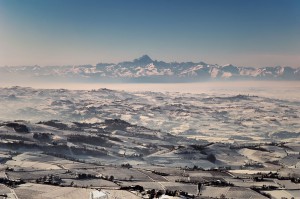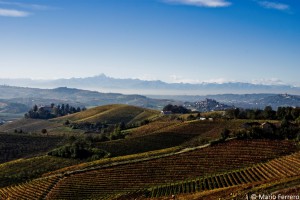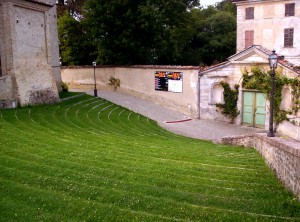Wandering through culture and breathtaking landscapes
This itinery will take you through areas devoted to the production of Dolcetto and Barolo, letting you discover little hamlets nestled in the countryside. Here, culture rises from seducing lonely landscapes, perfect for those who love peace and quiet or those seeking shelter from the sun on hot summer days.
The trip begins at Montelupo, located at the top of a hill. The village features an almost vertical graveyard and a baroque church overlooking a chestnut grove. The name of the village could possibly be a reference to a legend telling how the place was once populated by wolves. At the highest point there was a castle belonging to the Earls of Rangone, a renowned family of ancient Piedmont whose descendants are today the architects Carlo Francesco and Carlo Emanuele Rangone, Earls of Montelupo. The village boasts an amazing landscape: placed at 564m above sea level, its position is perfect to admire the wonderful surroundings; during clear days it is possible to see the entire west Alpine Arch dominated by Cervino (The Matterhorn), Monte Rosa and Monviso.
Ascending further you will approach Rodello, a small village spread out over the ridge of a green hill overlooking a panoramic but relaxing territory. Here you can take advantage of the healthy, fresh air which always has a low humidity. Thanks to these qualities, this is a renowned holiday and rehabilitation centre. No traces of the castle that was located where the city hall now sits are left. The Church dedicated to the Immaculate Conception (1749) is now the seat of the Museum of Contemporary Holy Art. The parish, designed by Francesco Rangone, is dedicated to Saint Lawrence.
Returning to the county road, you can reach Sinio, a little hamlet perched on the hill of the lush Valle Talloria. The village is gathered around the parish of Saint Frontiniano, which dates back to the 1700s and was also designed by Emanuele Rangone, and the remains of the, now privately owned, medieval castle. Also of interest is the eighteenth-century Confraternita dei Disciplinati, a Catholic confraternity: after many years of being abandoned, it has been restored and now, as a Municipality property, it is used as theatre. One cannot miss the summer night strolls organized by the local tourist office, among hills and roadside shrines which have been recently restored, as well as the ‘Notte delle Masche’, a Night of the Witches, which occurs every year on 14th August and turns the village into a magical and mysterious place.
From Valle Talloria, in order to reach Roddino, we must continue to go up through the hills. Here, the vineyard landscape leaves space for woods, grazing and hazelnut fields: we are in Pedaggera, walking towards Alta Langa. Placed on the top of a hill covered with Dolcetto and Nebbiolo vineyards, Roddino is almost at the border between Bassa and Alta Langa; in the ancient times the Salt Road passed through here. The village, throughout history, was subject to the marquises of Saluzzo and also had a castle which unfortunately has not survived. Where once there was the castle, there is now the parish of Santa Margherita, dated back to the 15th century but restored and expanded in 1928.
After this ‘taste’ of Alta Langa, let’s turn towards Monforte, returning to the Langa of Barolo. Today, it is still possible to notice the Medieval plant of the historical centre, hanging down around the castle, run by amazing narrow cobblestone streets. On the top of the hill, the noble eighteenth-century palace of the marquises of Scarampi del Cairo, obtained by the ancient castle, adorns the sloping and enchanting square dominated by the bell tower. The mighty Romanesque tower is all that remains of the ancient Medieval Church destroyed in the ‘900s. Because of its amphitheatre shape, the square has been transformed into a wonderful summer auditorium dedicated to the pianist Vladimir Horszowski who inaugurated it in 1986. The background also includes, together with the Scarampi palace and the tower, the Baroque oratory of Saint Elizabeth, the façade of the Church of the Disciplinati Bianchi and a beautiful view on Langhe and the entire Arch of the Alps. By taking the underpass to the right of the square, it is possible to go down to the hamlet. This underpass will certainly catch the visitor’s attention: according to the tradition, it is populated by ghosts who whisper and complain. They belong to the souls of the Cathars who, thousands of years ago, used to live here. The castle of Monforte, built in the Middle Ages, became a centre of Catharism, an heretical religious sect led by the legendary lady of that place, the Countess Berta; the manor house was taken by force and set on fire in 1028 by Ariberto d’Intimiano, Archibishop of Milan. Then in the ‘500s, the old castle was destroyed in order to be re-built in a wider and flatter place not to act as a fortress but simply as a luxury countryside dwelling.
After leaving the village, we suggest that you visit Perno and Castelletto, two small hamlets dipped in the silence of the vineyards, among castles and chapels.
Wine Cellars Along the Itinerary
Cascina Mucci
, Località Mucci, 2, Roddino CNFranco Conterno – Cascina Sciulun
, Loc. Bussia, 62, Monforte d'Alba CNCosta di Bussia, Tenuta Arnulfo
, Località Bussia, 26, Monforte d’Alba CNPodere Ruggeri Corsini
, Località Bussia Bovi 18, Monforte d'Alba CNDiego Pressenda – La Torricella
, Loc. S. Anna 98, Monforte d'Alba CNPodere Gagliassi
, Località S. Anna, 84, Monforte D'alba CNRocca Giovanni
, Loc. San Giuseppe 43/A, Monforte d‘Alba CNBussìa Soprana
, Loc. Bussia, 81, Monforte d'Alba CNFortemasso
, Loc. Castelletto, 21, Monforte d'Alba CNBroccardo
, Loc. Manzoni 22, Monforte d’Alba CNSara Vezza
, Loc. Castelletto 39, Monforte d'Alba CNAmalia Cascina in Langa
, Loc. Sant'Anna, 85, Monforte d'Alba CNMonvino
, Via Garibaldi 16 A, Monforte d'Alba CNRéva
, Località San Sebastiano 68, Monforte d’Alba CNSilvano Bolmida
, Località Bussia, 27/A, Monforte d'Alba CNPlaces to Eat Along the Itinerary
Diego Pressenda – La Torricella
, Loc. S. Anna 98, Monforte d'Alba CNHotel Ristorante Ca’ del Lupo
, Via Ballerina, 14/16, Montelupo Albese CNRistorante Gennaro Di Pace
, Vicolo della Chiesa 8 - Località Perno, Monforte d'Alba CuneoRéva
, Località San Sebastiano 68, Monforte d’Alba CNAccommodation Along the Itinerary
Franco Conterno – Cascina Sciulun
, Loc. Bussia, 62, Monforte d'Alba CNVilla Beccaris
, Via Bava Beccaris 1, Monforte dʼAlba CNCosta di Bussia, Tenuta Arnulfo
, Località Bussia, 26, Monforte d’Alba CNDiego Pressenda – La Torricella
, Loc. S. Anna 98, Monforte d'Alba CNHotel Ristorante Ca’ del Lupo
, Via Ballerina, 14/16, Montelupo Albese CNSogno in Langa
, Via Monchiero, sn, Monforte d‘Alba CNAmalia Cascina in Langa
, Loc. Sant'Anna, 85, Monforte d'Alba CNBel e Bun – Fenocchio Nocciole – PIEDMONT HAZELNUT IGP
, Loc. S.Eligio 6, Monforte d'Alba CNRéva
, Località San Sebastiano 68, Monforte d’Alba CNPlaces to buy Food and Wine Products Along the Itinerary
Bel e Bun – Fenocchio Nocciole – PIEDMONT HAZELNUT IGP
, Loc. S.Eligio 6, Monforte d'Alba CNCascina Buschea – PIEDMONT HAZELNUT IGP
, Via Spessa 25, Rodello CN




